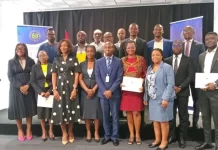
Government has called on Independent Power Producers (IPPs) in the country to help reduce debts and provide a stable energy supply for Ghanaians.
The advice comes after the government successfully secured terms for an amended Power Purchase Agreement (PPA), with CENIT Energy Limited (CEL), a Ghanaian independent power producer.
Per the agreement, CEL has decided to convert its power plant into a tolling structure and transfer all resulting cost savings to ECG.
A statement issued by the Public Relations Unit of the Ministry of Finance noted that, the commitment made by CEL is crucial in reinforcing government’s efforts to build a balanced and sustainable energy sector.
“The terms agreed to between government and CEL will produce a more favourable situation for both parties and ultimately reduce the cost of electricity for the people of Ghana,” the Ministry explained in the statement.
The Ministry of Finance also noted that amongst other things, “CEL has agreed to a further reduction in the capital recovery tariff of 38.9% as this will result in total savings to government and all Ghanaians in excess of US$200 million over the remaining life of the PPA.”
The Ministry also encouraged other Independent Power Producers (IPPs) to join CENIT to aid in the production of stable energy in the country.
“We welcome CENIT Energy’s commitment to Ghana and its role in regenerating the energy sector. CENIT is an important partner and a significant energy producer in Ghana. We encourage other IPPs to join CENIT in collaborating to help reduce onerous debts and to provide a stable energy supply for the people of Ghana. We are committed to building a competitive and dynamic energy sector where private investments can thrive, and the interests of the Ghanaian people and businesses continue to flourish,” the Ministry added.
At present, Ghana pays over US$500M a year for unused electricity. Most of the PPAs are legacy agreements, entered into under the previous administration in an uncoordinated and hasty attempt to end dumsor. The tariffs agreed were not competitive and have contributed significantly to the build-up of debt in the sector and oversupply of energy.
This Government, in collaboration with the World Bank, created the Energy Sector Recovery Programme (ESRP), identifying the policies and actions needed for financial recovery in the energy sector over a five-year horizon (2019-2023).
As part of the reforms, government is taking steps to institute competitive bidding for future additional capacity, to ensure that future tariffs are fair and in line with expected pricing benchmarks.
CBN

























